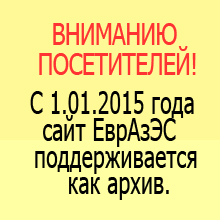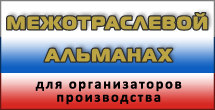|
convention convention on privileges and immunities of the Eurasian economic соmmunity1 convention on privileges and immunities of the Eurasian economic соmmunity1
The Republic of Belarus, the Republic of Kazakhstan, the Kyrgyz Republic, the Russian Federation and the Republic of Tajikistan, hereinafter referred to as the Parties, Wishing to provide necessary conditions for effective performance of the purposes and tasks of the Eurasian Economic Community, Being guided by the conventional principles and norms of internatio-nal law, Considering the positions of article 16 of the Contract on establishment of the Eurasian Economic Community according to which the Eurasian Economic Community and its officials use privileges and immunities which are necessary for performance of functions and achievement of the purposes provided by the Contract on establishment of the Eurasian Economic Community and contracts, operating within the limits of the Eurasian Economic Community, Have agreed as follows: Article 1 For the present Convention, the terms hereinafter shall have the following meaning: “Treaty” – the Treaty on establishment of the Eurasian Economic Community signed in the city of Astana on 10 October 2000; “ЕurAsEC” or the “Community” – the Eurasian Economic Community; “Member state” – a member state of the Eurasian Economic Community; “Receiving state” – the state on whose territory the Community body or its representation is located; “EurAsEС Organs”
or “Community Organs” – Interstate Council, Integration Committee,
Inter-parliamentary Assembly, the “Representation” – representation of the EurAsEС Integration Committee in a Community member state; “Secretary General” – the higher administrative official of the Community; “Officials” – persons confirmed by bodies of the Community as representing EurAsEС member states according to the appointment quotas allotted to every member state on a list determined by the Interstate Council; “Employees” – persons working as experts in EurAsEC Organs on the basis of contracts concluded with them; “Permanent Representative” – the person to whom the sending state assigns the duty to operate in this capacity; “Employees of the Permanent Representation” – the Permanent mission personnel, except for technical and ancillary staff; “Premises of EurAsEC Organs” – buildings or parts of buildings used for EurАsEС official purposes, and also residing of the Secretary General and officials of Community; “Permanent Representation premises” – buildings or the parts of buildings used for the official purposes of the Permanent Representation, and also as residences for EurAsEC Permanent Representative and employees of the Permanent Representation; “Representatives of member states” – representatives of member states to EurAsEC Organs, heads and members of delegations sent by member states to sessions of these Organs and official functions held within the limits of the Community; “Family members” – the spouse, minor-age children and dependents of the Secretary General, officials and employees of EurAsEC Organs, Permanent Representatives and employees of Permanent Representations of EurАsEC. Article 2
The Secretary General, officials and employees of the Community Organs shall be international employees. While carrying out their duties they should not request or receive instructions from authorities or officials of the Parties, nor from authorities extraneous to the Community. Each Party shall undertake to strictly respect the international character of the functions of officials and employees of Community Organs, and shall not exert influence on them during their execution of official duties.
I. PRIVILEGES AND IMMUNITIES OF COMMUNITY
Article 3
The property and holdings of the Community Organs shall enjoy immunity from any form of administrative or judicial intervention, except for cases when the Community itself refuses immunity. Premises of EurAsEC Organs and also its archives and documents including office correspondence, irrespective of the location, shall not be subject to a search, requisition, confiscation or any other form of intervention that interferes with their normal activity. Representatives of the corresponding governing bodies of the receiving state may not enter premises of bodies of the Community without the consent of the Secretary General or head of the EurAsEC Organ and conditions they have approved. Execution of any actions determined by corresponding governing bodies of the receiving state may take place on the premises of Community Organs only with the consent of the Secretary General or head of the corresponding EurAsEC Organ. Premises of EurAsEC Organs may not serve as a refuge for persons who are pursued under the laws of any of the Parties or subject to delivery to a member state or third state. Inviolability of the premises of Community Organs shall not grant the right to use them for purposes not compatible with the functions or tasks of EurAsEC, or threatening the safety of the Parties or the interests of their physical or legal persons. The receiving state shall take appropriate measures for protection of ЕurAsEC premises against any intrusion or damage. Article 4 EurAsEC Organs shall be exempt from direct taxes and tax collections, duties and other payments arising on the territory of the receiving state, except payment for specific kinds of service (services). Objects and other property intended for official use by EurAsEC Organs and Representations shall be exempt in Member States from customs duties, taxes and related duties, except for storage charges, customs registration outside areas defined for this purpose or outside operating times of the corresponding customs body or suchlike service, according to the procedures for international organizations. Article 5 Concerning the official communication facilities, Community Organs and Representations shall enjoy no less favorable conditions than those provided for diplomatic missions by the receiving state. Article 6 EurAsEC Organs may place a flag, emblem or other symbol of the Community on premises occupied by them and vehicles belonging to them. Article 7
The Community may, in accordance with the legislation of member states and its own purposes and functions, publish and distribute printed matter when such publication is provided for by the decisions of EurAsEC Organs. Article 8
The receiving state shall render assistance to the Community in the acquisition or receipt of premises necessary for the realization of Community functions. Article 9
The Community shall provide constant cooperation with the corresponding governing bodies of member states with a view to maintaining an appropriate dispensation of justice, implementing the instructions of law enforcement bodies and preventing any abuse in connection with the privileges and immunities provided by the present Convention.
II. PRIVILEGES AND IMMUNITIES OF THE SECRETARY GENERAL, OFFICIALS AND EMPLOYEES OF EURASEC BODIES
Article 10
Unless they are citizens of the receiving state, the Secretary General and members of his family living with him shall enjoy privileges and immunities of diplomatic representatives, as stated in the Vienna Convention on diplomatic relations dated 18 April 1961.
Article 11
Officials of the Community and family members living with them shall: a) not bear criminal, civil or administrative responsibility for their own oral or written statements or for their actions in the course of duty; b) be exempt from taxation of wages and other compensations paid by the Community; c) be exempt from state duties; d) be exempt from restrictions on immigration and from registration as foreigners; e) be exempt from payment of customs duties, taxes and related duties for objects and other property intended for initial acquisition, except charges for transportation, storage, customs registration outside areas defined for this purpose or outside the operating times of the corresponding customs body or suchlike services; j) enjoy the same privileges on repatriation as those enjoyed by diplomatic representatives during international crises. Category “b” shall not apply to officials who are citizens of the receiving state or permanent residents there. Category “d” shall not apply to officials who are citizens of the receiving state or permanent residents there, or to family members living with them. Article 12 The Secretary General, officials and employees of Community Organs shall have no right to engage in commercial or any other activity in the interests of personal benefit or benefit of other persons, except for scientific, creative and teaching activity. If persons exempt from taxation in the receiving state according to articles 10 and 11 of this Convention receive an income from activities specified in the present article, they shall declare the cumulative income received from such activity and pay taxes therefrom, according to the legislation of the receiving state. Article 13 The Secretary General and officials of the Community shall observe the requirements provided by the laws and rules of the receiving state in relation to insurance for damage which may be caused to third parties in connection with the use of a vehicle. Article 14 Employees of the Community Organs shall not be subject to the jurisdiction of judicial or administrative bodies of the receiving state in relation to actions made during the performance of official functions, except in the following cases: a) claims for damage compensation in connection with a road or transport incident caused by a vehicle belonging to the Community or the employee driving it; b) claims in connection with death or physical injury caused by the actions of an employee. Employees of Community Organs shall be exempt from restrictions on immigration and from registration as foreigners. Article 15
Privileges and immunities enjoyed by the Secretary General and officials or employees of Community Organs shall be granted not for personal benefit, but for the effective and independent performance of their official functions in the interests of the Community.
Article 16 The Secretary General, officials and members of their families shall enjoy the privileges and immunities provided in this Convention from the moment they arrive on the territory of the receiving state on their way to a further destination, or if they are already on this territory, from the moment the Secretary General or officials begin performing their duties. When the Secretary General or official’s functions are terminated, their privileges and immunities and also those of family members living with them shall usually cease at the moment they depart from the receiving state or after a reasonable time has elapsed, whichever is soonest. The privileges and immunities of family members no longer apply when they cease to be members of an official’s family, with the reservation that if such persons intend to leave the receiving state after a reasonable juncture, their privileges and immunities shall remain until they depart. In case of death of a Secretary General or Community official, members of his family living with him shall continue to enjoy their privileges and immunities until departure from the receiving state, or until a reasonable time for departure from the receiving state has elapsed, whichever is soonest. Article 17
All persons using privileges and immunities according to this Convention shall be obliged, without damage to their privileges and immunities, to respect the laws and regulations of the receiving state. They also shall be obliged not to interfere with internal affairs of this state.
Article 18 A Member State may refuse immunity to an official sent there when, according to this state, that immunity interferes with the realization of justice and refusal of immunity does not damage the purposes for which it was given. The Interstate Council shall also have the right to refuse the immunity of a Secretary General or official. Refusal of immunity should be explicitly stated. III. PRIVILEGES AND IMMUNITIES OF MEMBER STATE REPRESENTATIVES
Article 19
While carrying out official duties and while proceeding to a place where functions organized by the Community in member states are due to be carried out, representatives of member states shall enjoy the following privileges and immunities: a) immunity from personal arrest or detention, and also from the jurisdiction of judicial and administrative authorities concerning all actions they make take in this capacity; b) inviolability of dwelling; c) clearing of accompanied luggage and hand luggage at customs inspection if there are no serious grounds to believe that these contain objects and other property not intended for official or private use, or objects and other property which it is forbidden to import or export or which are regulated by quarantine and other regulations in the member state; d) clearing of restrictions on immigration, and from registration as foreigners.
Article 20
Privileges and immunities enjoyed by representatives of member states shall be granted not for personal benefit, but for the effective and independent performance of their official functions in the interests of the Community. In the receiving state representatives of member states should not be engaged in commercial or other activities in the interests of personal benefit or the benefit of other persons, except for scientific, creative and teaching activities.
Article 21
The premises occupied by representatives of member states, furnishings and other property, and also vehicles for official use shall enjoy immunity from search, requisition, arrest and executive actions.
Article 22
Archives and documents of the representatives of member states shall be inviolable at all times, irrespective of data carriers and their location. Article 23
Provided this does not contradict laws and rules concerning zones where entrance is forbidden or regulated for state security reasons, the receiving state shall allow all representatives of member states freedom of movement and travel on its territory for the performance of official functions.
Article 24
The sending member state may refuse immunity to a representative when it is believed that this immunity interferes with realization of justice and refusal of immunity does not hinder the purposes for which it was granted. Refusal should be explicitly stated. If the sending member state does not refuse immunity of the representative concerning civil suits, it shall make every effort to ensure a just resolution of the matter. Initiation of proceedings shall deprive the member state representative of the right to immunity from jurisdiction concerning any counterclaim directly connected with the basic claim.
IV. PRIVILEGES AND IMMUNITIES OF PERMANENT REPRESENTATIVES, PERMANENT MISSIONS, AND ALSO THEIR EMPLOYEES
Article 25
Member states may establish Permanent missions to the Community (hereinafter – Permanent Representation).
Article 26
The Permanent Representation apart from the Permanent Representative which carries out the functions of the head of the Permanent Representation may include employees, technical and ancillary staff.
Article 27
The Permanent Representation’s premises including private residences of the Permanent Representative are inviolable. The authorities of the receiving state may not enter these premises without the consent of the Permanent Representative, except in cases of fire or other circumstances demanding immediate safety measures. The Permanent Representation’s premises and also the Permanent Representative’s means of transportation shall enjoy immunity from search, requisition, arrest and executive actions.
Article 28
Archives and Permanent Representation documents shall be inviolable at all times, irrespective of data carriers and their location.
Article 29
The Permanent Representative shall possess the right to place a flag and emblem of the sending state on the premises. While asserting the rights provided in these Article laws, the rules and customs of the receiving state shall be taken into consideration.
Article 30
The receiving state shall assist the sending state in receipt or acquisition of the premises necessary for the Permanent Representation.
Article 31
Concerning official communication facilities, the Permanent Representation shall enjoy no less favorable conditions than those the receiving state grants to diplomatic missions.
Article 32
The Permanent Representation shall be exempt from all direct taxes and tax collections, duties and other payments arising on the territory of the receiving state, excepting payment for municipal and other kinds of service.
Article 33
1. Permanent Representatives and employees of the Permanent Representation shall be inviolable and enjoy immunity from the criminal jurisdiction of the receiving state. They shall also enjoy immunity from civil and administrative jurisdiction of the receiving state, except in the following cases: a) claims connected with private real estate on the territory of the receiving state, if the given person is not the owner on behalf of the sending state for the purposes of the Permanent Representative; b) claims connected with inheritance in which the given person represents himself as executor of a will, trustee of hereditary property, legal inheritor, inheritor according to a will or inheritor refusing to accept inheritance as a private person, instead of on behalf of the sending state; c) claims for compensation of damages in connection with road and transport incidents caused by a vehicle belonging to the Permanent Representative or the given person, or driven by him; d) claims in connection with death or physical injury caused by the actions of the given person. 2. Immunity of the Permanent Representative and employees of the Permanent Representation from the jurisdiction of the receiving state does not exempt them from the jurisdiction of the sending state.
Article 34
Permanent Representatives, employees of the Permanent Representation and members of their families shall be exempt from state duties in the receiving state, unless they are citizens of the receiving state or permanent residents.
Article 35
1. According to laws and rules which the receiving state may accept, it shall allow the Permanent Representative and employees of the Permanent Representation to import without customs duties, taxes and suchlike charges, except for those related to transportation, storage and customs registration outside the areas defined for this purpose or outside the operating times of the corresponding customs body and similar services: a) objects and other property the Permanent Representative intends for official use; b) objects and other property intended for private use by the Permanent Representative and employees of the Permanent Representative. 2. Accompanied luggage and hand luggage belonging to the Permanent Representative and employees of the Permanent Representation shall be exempt from customs inspection if there are no serious grounds to assume that these contain objects and other property to which the exemptions specified in paragraph 1 of this Article do not apply, or objects and other property which it is illegal to export or which are regulated by quarantine and other regulations in the receiving state. In such cases examination shall be made only in the presence of the person who is exempt, or his authorized representative. 3. This Article does not apply to the Permanent Representative and employees of the Permanent Representation if they are citizens of the receiving state or permanent residents.
Article 36
In the receiving state the Permanent Representative and employees of the Permanent Representation should not be engaged in commercial or other activity in te interests of personal benefit except for scientific, creative and teaching activities. Permanent Representatives and employees of the Permanent Repre-sentation shall be exempt from taxation of wages and other compensations paid by the sending state, and also from charges and duties on the territory of the receiving state excepting payment for specific kinds of service (services), unless they are citizens of the receiving state or permanent residents.
Article 37
The sending state shall notify the Integration Committee and the receiving state: a) about the appointment of the Permanent Representative or employees of the Permanent Representation, about their posts and ranks, their arrival and departure dates or the termination of their functions, also about any other changes reflected in their status which may occur during service in the Permanent Representative; b) about the arrival and definitive dates of any person who is a family member of the Permanent Representative or employee of the Permanent Representative and living with him, also in appropriate cases when a person becomes or ceases to be a member of his family; c) about the dates when technical and ancillary staff begin and end their employment in the Permanent Representation; d) about the location of premises enjoying inviolability according to Article 27 of the Convention, and also any other data which may appear necessary for identification of such premises. Article 38
1. Each person having the right to the privileges and immunities according to this Section of the Convention shall enjoy them from the moment of arrival on the territory of the receiving state when proceeding to their place of employment, or if the person is already on this territory, from the moment when the receiving state or sending state is notified of the appointment by the Community. When the functions of the person enjoying these privileges and immunities cease, the privileges and immunities shall usually apply until the person leaves the territory of the receiving state, or after a reasonable time has elapsed. However, immunity shall continue to apply concerning actions made by such persons while performing their functions as employee of the Permanent Representation .
Article 39
Permanent Representatives and employees of the Permanent Representation should, as a rule, be citizens of the sending state.
Article 40
Without impairing the privileges and immunities provided by this Convention, Permanent Representatives, employees of the Permanent Representation and members of their families shall be obliged to respect the legislation of the receiving state. They are also obliged not to interfere in the internal affairs of this state. Article 41
Permanent Representatives, employees of the Permanent Representation and members of their families should carry out their obligations according to the legislation of the receiving state on responsibility insurance before third parties concerning all vehicles they use or own. Premises of the Permanent Representation and those occupied by the Permanent Representative, employees of the Permanent Representation and members of their family should not be used for purposes incompatible with the implementation of official functions by the Permanent Representative or employees of the Permanent Representation.
Article 42
Members of the Permanent Representative’s family and those of employees of the Permanent Representation shall enjoy the same privileges and immunities as employees of the Permanent Representation unless they are citizens of the receiving state or permanent residents.
Article 43
The sending member state may forfeit the Permanent Representative’s immunity and that of employees of the Permanent Representation when they believe this immunity interferes with the realization of justice and the refusal of immunity does not hinder the purposes for which it was granted. Refusal should be explicitly stated. If the sending member state does not suspend the Permanent Representative’s immunity or that of an employee of the Permanent Representation in a civil suit, it shall make every effort to ensure a just resolution of the matter. Initiation of proceedings by Permanent Representatives or employees of the Permanent Representation shall deprive them of the right to immunity from jurisdiction concerning any counterclaim directly connected with the basic claim.
Article 44
Provided that it does not contradict laws and rules on zones, entrance to which is forbidden or regulated for state security reasons, the receiving state shall allow all representatives of member states freedom of movement and travel on its territory, as required for the performance of their functions. Article 45
The receiving state and Community shall render assistance to the Permanent Representation in performance of its functions.
V. LABOUR RELATIONS AND SOCIAL SECURITY
Article 46
Labor relations of the Secretary General, officials and employees of EurAsEC Organs shall be regulated by the Community. Labor relations of the technical and ancillary staff of EurAsEC Organs shall be regulated by the national legislation of the receiving state.
Article 47
Pension maintenance of the Secretary General, officials and employees of EurAsEC Organs shall be carried out under the legislation of the states where they are citizens. Thus EurAsEC Organs shall transfer deductions for pension maintenance established by national legislation from the Community budget to the corresponding funds of Community member states where the Secretary General, officials and employees are citizens. Expenses on payment of pensions to the Secretary General, officials and employees of EurAsEC Organs shall be borne by the state where they are citizens.
Article 48
Appointment and payment of social insurance (maintenance) benefits to the Secretary General, officials and employees of EurAsEC Organs and members of their families is carried out according to the legislation of the ЕurАsEС member state where the specified persons work, or members of their families work (live). Expenses on payment of social insurance benefits shall be borne by the state on whose territory the Secretary General, officials or employees of EurAsEC Organs or members of their families work, without mutual settlements. Thus deductions in social and medical insurance funds shall be made from the Community budget, according to the legislation of the receiving state. Article 49
At the appointment of pension or social insurance (maintenance) benefits, the period of work as Secretary General, official or employee of a EurAsEC Organ is included in the insurance or service record. The earnings received by specified persons in their period of work for EurAsEC Organs shall be considered when allocating the amount of the pension or social insurance (maintenance) benefit according to the national legislation of the state in which these persons are citizens or permanent residents.
VI. FINAL PROVISIONS
Article 50
Disputes over issues connected with the application or interpretation of this Convention shall be resolved by consultations and negotiations between the interested parties.
Article 51
This Convention is subject to ratification. Instruments of ratification shall be deposited with the Integration Committee. The Convention shall come into force from the date the last ratification instrument is delivered to the depositary for storage.
Article 52
This Convention shall be open to any state entering EurAsEC according to article 9 of the Treaty. Documents on joining this Convention shall be stored by the depositary. For the joining state this Convention shall come into force from the date when the joining document is delivered for storage in the depositary.
Article 53
Any of the Parties may leave this Convention by giving notice to the depositary in writing. This Convention shall no longer apply to the Party from 6 months after the date when such a notice is received by the depositary. Article 54
Changes and additions to this Convention may be stated in separate protocols. Any of the Parties may propose changes and additions in a corresponding notice to the depositary. Reports on changes and additions shall be subject to ratification and come into force after the last instrument of ratification has been delivered to the depositary. This Convention shall be in force for the validity period of the Treaty on establishment of the Eurasian Economic Community, signed in the city of Astana on 10 October 2000.
Done in the city of The original copy of the Convention shall be stored with the Integration Committee, which shall distribute a certified copy to each signatory state.
For the Republic of Belarus A. Lukashenko For the Republic of Kazakhstan N. Nazarbayev For the Kyrgyz Republic A. Akayev For the Russian Federation V. Putin For the
Annex |
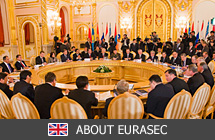

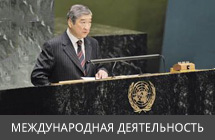
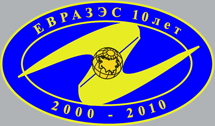
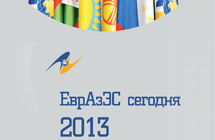
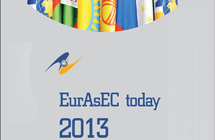
Поиск 10.10.2014 Заседание Межгосударственного совета ЕврАзЭС07.10.2014 Мультимедийная пресс-конференция в агентстве «Россия сегодня»03.10.2014 Встреча с Послом Финляндской Республики04.08.2014 Встреча Генерального секретаря ЕврАзЭС с Послом Республики Таджикистан20.06.2014 Премии Петербургского международного юридического форума «За вклад в развитие правовой интеграции на евразийском пространстве»28.05.2014 Договор о Евразийском экономическом союзе – важнейшее событие в новейшей истории наших стран25.05.2014 Презентация книги «Евразийский проект Нурсултана Назарбаева, воплощенный в жизнь. К 20-летию евразийского проекта 1994–2014»24.05.2014 VII АСТАНИНСКИЙ ЭКОНОМИЧЕСКИЙ ФОРУМ. Панельная сессия «Евразийской экономической интеграции – 20 лет. Итоги и перспективы»24.05.2014 VII Астанинский экономический форум и II Всемирная Антикризисная конференция, 21-23 мая 2014 года, Астана24.05.2014 Петербургский международный экономический форум, 23 – 24 мая 2014 года, Санкт-Петербург |

Евразийское экономическое сообщество
ЕврАзЭС
-
Страны участники
 Беларусь
Беларусь
-
 Казахстан
Казахстан
-
 Кыргызстан
Кыргызстан
-
 Россия
Россия
-
 Таджикистан
Таджикистан
-
 Узбекистан
Узбекистан
-
 Молдова
Молдова
-
 Украина
Украина



